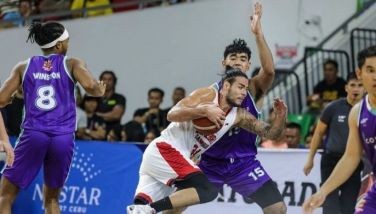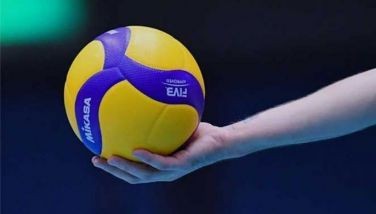Sports for higher purpose
Each time college basketball season comes around, it’s like a collective switch is turned on in Philippine society, particularly among the youth. Similar to summer around the world and soccer season in Europe, there is an increase in awareness of sport, and the media are suddenly filled with details of every sporting event available to the youth. In fact, locally, the last few years have even seen new websites and magazines catering exclusively to amateur (meaning school) sports.
If you look at all the sports news now, a common thread one can pick up is the question of purpose, from acquiring head coaches to switching teams to putting together sports programs. The question often left unanswered is: why did that happen?
Let’s start with the NBA. For example, why did the Detroit Pistons not come to terms with Avery Johnson, when there seemed to be such good communication between them? Apparently, Johnson wanted a four-year deal, so he could reap the rewards of rebuilding the team. Pistons management, apparently, didn’t want to be stuck in the situation of owing a head coach money after they terminate him three times in a row. That seems to be the only reason that makes sense of the decision to hire Cleveland assistant John Kuester, instead. Hedo Turkoglu is another case in point. After coming within a few games of an NBA championship, the versatile forward opts to move to Toronto, even though he was already deep in talks with Portland. Apparently, his wife prefers Toronto because there is a big Turkish community there, and of course, the money ($56 million over the Trailblazers’ $50 million) is substantially bigger. Therefore, Turkoglu’s main purpose in moving is not to win an NBA title but to have security.
I often ask myself these questions when covering college basketball, as well. Why do the schools do it? Historically, sports has been a substitute for war, a showcase of school pride, and a way to generate commercial interest from advertisers and even alumni. Players do it to get a free education, board and lodging, and exposure in their dreams of becoming pros. That’s why certain schools breed more pro basketball players than others. The students use athletics to prepare for a future in basketball, not necessarily in whatever field it is they’re studying.
Sometimes, one of my sons will ask me: what’s the point? I turn the question around to them: why do it at all? They inevitably answer me, because they enjoy it, but maybe their team isn’t as good this year, they want to learn more, and so on. Of course, there are times they don’t like the referees’ calls, or some other kid from another school is getting on their nerves, and so on. I just remind them, why are you playing basketball? My older son wants to make Ateneo’s UAAP team. My younger son wants to play in the PBA. When I remind them of that, I ask: will getting upset help them achieve their purpose? They get the message, and nod.
There is a saying that, while most animals grouse and grumble in the storm, the eagle flies above it. That should be our attitude when we have a higher purpose. For my sons, aside from their personal self-expression, I believe they play basketball because they want to be better at it, and it reveals to them their attitudes about life in a safe environment.
This reminds me of the program initiated by former Philippine Sports Commission chair Butch Ramirez in Mindanao. His Sports for Peace program has drawn government support, and has unified Christians, Muslims and indigenous peoples in Mindanao for the last few years. His affiliated project, “Bola, Hindi Bala” also took him and his team to some dangerous places, where he exposed each side’s humanity to the other. His mission is clear: use sports to bring Filipinos closer together. I’ve always wondered why it hasn’t been done nationwide.
Looking further back, I recall a young man who permanently changed the way the Olympic Games are ended, with a simple anonymous letter.
Seventeen-year-old apprentice Carpenter John Ian Wing, who was in Australia during the 1956 Melbourne Olympics, wrote a letter to the organizing committee a few days before the games were to end. He suggested that all the delegations march together at the Games’ climax, as one nation. After all, he reasoned, wasn’t that what the Olympics were all about? His suggestion was followed, and every Olympics since has featured the athletes walking freely in every Olympic stadium, shaking hands, taking pictures, waving to the crowd, as one.
Thirty years later, Wing revealed himself as the one who wrote the letter. He was awarded an Olympic medal for his outstanding contribution to the Olympic movement, becoming the first Chinese individual to ever receive an Olympic medal. He was clear on what the purpose of sports was for him. All that was needed was a means to express it.
And as they say, when the intention is clear, the mechanism will appear.
- Latest
- Trending


























